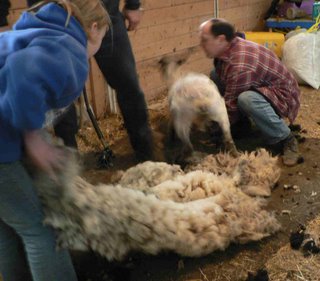 Yesterday afternoon I went to a neighbor's house for our sorta-twice-monthly knitting or spinning (or crocheting or felting). My former suburban mind still finds it humorous to call someone a neighbor who lives four miles away, but then I remind myself that I only pass four houses between here and there, so she's only five houses away. Before getting to the heart of this post, I have to announce that I finished knitting my scarf! It is so exciting to have a scarf that I knitted from yarn that Katherine spun from wool that grew on our sheep named White Feather. When I look at clothing in a store, I wonder if the person who sewed it was paid a living wage; and if it contains animal fiber, I wonder if the animal was treated humanely. I wonder what type of chemicals were used to process the fiber. But I know everything about this scarf. I know that White Feather has had ram-ewe twins for the past two years, and she's the friendliest sheep on our farm. She loves to be scratched on her head. Katherine loves spinning, and she was happy to spin the yarn for me. No chemicals were used in processing, and there is the ocassional bit of straw stuck in the wool to remind me just how natural it is. Making my own scarf from scratch is one of the things that is so wonderful about our life out here.
Yesterday afternoon I went to a neighbor's house for our sorta-twice-monthly knitting or spinning (or crocheting or felting). My former suburban mind still finds it humorous to call someone a neighbor who lives four miles away, but then I remind myself that I only pass four houses between here and there, so she's only five houses away. Before getting to the heart of this post, I have to announce that I finished knitting my scarf! It is so exciting to have a scarf that I knitted from yarn that Katherine spun from wool that grew on our sheep named White Feather. When I look at clothing in a store, I wonder if the person who sewed it was paid a living wage; and if it contains animal fiber, I wonder if the animal was treated humanely. I wonder what type of chemicals were used to process the fiber. But I know everything about this scarf. I know that White Feather has had ram-ewe twins for the past two years, and she's the friendliest sheep on our farm. She loves to be scratched on her head. Katherine loves spinning, and she was happy to spin the yarn for me. No chemicals were used in processing, and there is the ocassional bit of straw stuck in the wool to remind me just how natural it is. Making my own scarf from scratch is one of the things that is so wonderful about our life out here.My neighbor and I try to get together every two weeks so we can work on our fiber projects. She has alpacas. We have sheep and angora rabbits. Our daughters are very close in age and great friends. Although both of them know how to knit, they usually wind up playing while we moms work on our projects, chat and have afternoon tea. Part of our conversation yesterday centered on how little human interaction there is in our modern world. My family has recently gone through all the movies made from Jane Austen books, and they have left me feeling dreadfully cheated. People used to connect with each other so much more than we do today. I can understand why the Amish are opposed to having telephones in their homes but accept the necessity of having them for business. They value the importance of real human connections and realize that the telephone would reduce the quality of their lives in many ways. Between the telephone and email, we have this false sense of connection to people, but neither can replace the joy and relaxation of sitting down with a friend over tea or for a meal. While regular contact with people is important for mental health in good times, it is even more important in sad times. If a person is ill, how can a phone call compare to a visit and a fresh bouquet of flowers or an offer of assistance for something that may have fallen through the cracks during the illness? If someone has lost a loved one, how can an email compare to a hug?
In Jane Austen's time, people regularly visited each other. It was a part of the daily chores of English ladies to pay social calls on each other. They regularly had dinner guests, and following dinner, they played cards or entertained each other by playing the piano and singing. Women in 19th century America had quilting bees. Men helped each other build a barn or harvest their crops in the fall. Today, farmers have machines to harvest their crops. They pay professionals to build a barn. Few women sew or engage in fiber arts. The family dinner is becoming an endangered activity. The thought of inviting friends to dinner is rare indeed. People are building more expensive kitchens, and they are cooking less. And people are spending less time with each other.
In 2006, people spend time with their computers, their iPods, their TiVo, their Xbox, their PlayStation, their BlackBerry. While they feel more connected than ever, they are actually less connected to real live human beings than ever before. The words are there, the commitments are there, but the benefits of human interaction are gone. Somehow a smiling emoticon just doesn't give us the same emotional lift as a real live smile from a person we know and care about. "LOL" doesn't make us feel as good as hearing a friend laugh at something we said.
So, what are we to do? Thoreau's words come to me again, as they have so many times in the past. "Live deliberately." Stop. Think. Examine choices. Turn off the auto pilot that is pushing us through life. I have attempted to banish the phrase, "I don't have time," from my speech. It's a lie. I have all the time in the world, and I have a choice about how I spend it. Last summer, I made a conscious decision to invite friends over for ice cream one afternoon a month. One woman, commenting about what a great idea it was, asked me how I had time for it. I replied, "I just decided to do it." It sounds simple, but life is simple. I wrote it on my calendar, and I planned around it. Adjusting my thinking has not been simple though. I still catch myself thinking that I can invite someone over "next week." After a month or two of planning to invite someone next week, I am reminded of what my mama used to say ... "Tomorrow never comes," and I stop myself in my tracks and send the email or make the phone call to invite someone over.





